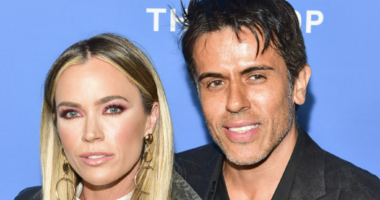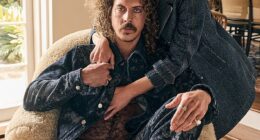When South Australian winemaker Nick ‘Duggie’ Dugmore was told he had bowel cancer at just 39, his first emotion wasn’t disbelief, it was déjà vu.
‘I remember telling friends six weeks before I was diagnosed, “I think I’ve got bowel cancer”,’ he told Daily Mail.
‘I was just so out of tune with my body before, but something deep down told me something was wrong.’
For the McLaren Vale-based father-of-two, who has been making wine since his early 20s, life once revolved around long days in the vineyard, regional wine competitions, and the relentless drive to build his label, Stoke Wines.
But in 2023, everything changed when a 5cm tumour was found in his bowel.
It was a diagnosis that would not only test his strength, but completely transform the way he lives, and what he believes caused his illness in the first place.
Before his diagnosis, Duggie was the picture of health, describing himself as energetic, active, and busy as he built a life with wife Rebecca and their two children Finley, seven, and Flora in the quiet coastal town of Willunga.
He’d built Stoke Wines from the ground up after losing his job during Covid, which he credited as a ‘blessing in disguise’.

When South Australian winemaker Nick ‘Duggie’ Dugmore was told he had bowel cancer at just 39, his first emotion wasn’t disbelief, it was déjà vu

For the McLaren Vale-based father-of-two, who has been making wine since his early 20s, life once revolved around long days in the vineyard

But in 2023, everything changed when a five centimetre tumour was found in his bowel
That freedom led him to take over a vineyard on Kangaroo Island, one he immediately converted to organic farming.
But despite his passion for natural practices, he believes it was years of working around conventional vineyards that may have silently damaged his health.
‘In hindsight there were a lot of symptoms,’ he said, remembering back to the period before his diagnosis.
‘The main one was blood in my stools, so I did a test that came back negative, but I still knew something wasn’t right.’
His persistence led to a colonoscopy, which revealed the devastating news: a large tumour in his upper rectum and cancer already spread to three lymph nodes, placing him at stage three bowel cancer.
Unlike most patients, Duggie’s doctor suggested a newer treatment approach starting with chemotherapy and radiation before considering surgery. He was the 100th patient to do it this way, and had a full clinical response – the tumour was gone.
But sadly, that victory didn’t last long, with Duggie confirming it had come back in his lungs in the form of four small lumps, putting his cancer now at stage 4.
Even so, he insists he currently feels the healthiest he’s ever been, boasting a six-pack and more energy than ever before. But for all his calm and positivity, he admits one emotion still lingers: anger.

Duggie was treated with chemotherapy and radiation and his tumour disappeared – only to return in his lungs one year later, this time advancing his cancer to stage four

Despite his ongoing health battles, he insists he feels the healthiest he’s ever been, admits one emotion still lingers: anger (Pictured: with wife Rebecca)
‘I took full responsibility for my cancer as it wasn’t just about one thing. Cancer is death by a thousand cuts, but glyphosate was a big one,’ he said.
Glyphosate – the active ingredient in many weed killers – is the world’s most widely used herbicide. It was recently reapproved for use in Australia for another 10 years, despite mounting international concern over its potential health effects.
‘I got a rash once while working in a vineyard surrounded by farms that had been sprayed,’ he recalled of a time in late 2022.
‘It was all over my body, even inside my mouth, so that was the first clue. When I looked back I realised my cancer started about 16 to 18 months after that.’
He’s since spent years researching the chemical, which he claims disrupts critical pathways in the body and works on crops by disrupting what’s called the shikimate pathway in plants.
‘At the time, they thought mammals didn’t have these same pathways, but now we know our gut bacteria do. We’re more bacteria and fungi than human, and glyphosate kills what keeps us healthy,’ he said.


Duggie recalls developing a severe rash in late 2022 after working near sprayed vineyards, which was his first clue something was wrong. His cancer began 18 months later, sparking years of research into the chemicals that disrupt vital pathways in plants and humans alike
Growing alarm among experts
Many scientists and medical professionals have raised concerns about glyphosate’s safety, and for cancer patient Duggie, it’s only strengthened his conviction that the chemical is far from harmless.
Supporting his view is Professor Lin Fritschi, an epidemiologist within the School of Public Health at Curtin University, who said the evidence around glyphosate and cancer risk remains incomplete.
‘The fact the IARC stated there is “suggestive evidence” that glyphosate causes cancer means more information is needed on the issue,’ she said in an expert commentary published by Scimex.org following Australia’s first glyphosate-related cancer lawsuit.

Many scientists and medical professionals have raised concerns about glyphosate’s safety, and for cancer patient Duggie, it’s only strengthened his conviction that the chemical is far from harmless
She urged anyone using glyphosate to consider safer alternatives and to take greater precautions if they do continue to use it.
‘For glyphosate, the manufacturers recommend wearing eye protection, a respirator with a replaceable filter, rubber gloves, and cotton overalls buttoned at the neck and wrist,’ she said.
‘A strong message from this is that labelling of pesticides in Australia needs to be improved.’
Her warning highlights a point Duggie feels passionately about – that those who work closely with the land deserve better protection and clearer information about what they’re exposed to.
However, not all experts share the same view.


Despite global controversy, Australian regulators recently reapproved glyphosate until 2035, citing a lack of evidence to ban it. The decision left Duggie frustrated, urging his online community to pay attention, especially since the chemical is already banned in thirty-three other countries
However Professor Ivan Kennedy, from the University of Sydney and an expert in risk assessment and the environmental fate of pesticides, believes concerns about glyphosate have been overstated.
‘The IARC made a “bad mistake” in claiming glyphosate is a probable cause of cancer,’ Professor Kennedy said in the same Scimex report.
‘There is no convincing evidence for this, and much evidence gathered over 40 years about it as the safest herbicide known.’
Despite conflicting opinions, the Australian Pesticides and Veterinary Medicines Authority (APVMA) recently reapproved glyphosate’s use until 2035, citing insufficient evidence to ban it.
That decision has left Duggie fuming and urging his large online community not to ignore it, especially as glyphosate has been banned in 33 other countries.
A fight bigger than wine
Today, Duggie’s mission goes far beyond making great wine.
He’s using his platform to raise awareness of what he believes is a dangerous chemical that’s harming not only the land he loves, but the people who live on it.
‘I was once all about being the best winemaker around but now I just want to farm in a way that doesn’t poison the planet,’ he said.

Today, Duggie’s mission extends beyond winemaking and he’s using his platform to highlight the dangers of harmful chemicals affecting both the land and its people. ‘I used to chase being the best winemaker, but now I just want to farm without poisoning the planet’

As for his own health, Duggie continues to live life as fully as possible, crediting daily meditation, eating clean, time with his family and not living in constant fear anymore. ‘I’m angry, yes, but I’m also hopeful,’ he concluded
His vineyard has now become a testing ground for what he calls ‘living soil’ which is free of sprays, chemicals and artificial fertilisers.
‘It’s all connected – the soil health, gut health, human health, it’s one and the same,’ he said.
He and his wife Rebecca have planted a food forest and are adding a market garden at their winery, aiming to provide fresh produce to newly diagnosed cancer patients and offer a place of comfort and strength during those first, fearful days after diagnosis.
He’s also calling for greater transparency in farming and chemical regulation because he’s passionate that ‘people deserve to know what’s being sprayed on their food, in their neighbourhoods, [and] in their kids’ schools’.
As for his own health, Duggie continues to live life as fully as possible, crediting daily meditation, eating clean, time with his family and not living in constant fear anymore.
‘I’m angry, yes, but I’m also hopeful,’ he concluded.
‘Because once you start looking into this stuff, you can’t unsee it. And I think people are finally starting to wake up.’









